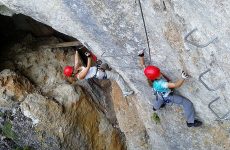
Ever heard of bouldering? Do you know the difference between bouldering and rock climbing? Do you know that unlike rock climbing, you need less equipment for bouldering? In this article, you will learn the basics and some of the benefits you can gain from bouldering.
Bouldering is a form of climbing that does not involve a rope, harness, or protection gear for climbing equipment. With bouldering, instead of climbing cliff faces, you climb large boulders.
However, bouldering is still a form of rock climbing, with only the bare essentials being involved.
It is easy to assume bouldering is easy, however, it’s not. You might think that bouldering lacks the technical difficulty and the long vertical distance faced with rock climbing. However, this is made up for by the increased difficulty in each of the moves in what are called bouldering problems.
Bouldering ‘problems’ are equivalent to ‘routes’ in sports climbing. Bouldering problems are like puzzles where you need to unravel the puzzle with your body. You must utilize your upper and lower body strength, climbing technique, and extremely strong fingers and core to reach the top of the boulder. In bouldering terminology, that is called “topping out”.
In bouldering, you don’t carry a rope or use fix any protective gear into the wall or rock. You can make use of chalk bags to chalk around. You can also use dedicated climbing shoes for getting traction. Furthermore, portable landing pads called “crash pads” can be used to cushion your landing when you jump off the boulder or inadvertently fall.
Bouldering and Free Soloing
Free soloing is quite different from bouldering. Although it does not require tools like rope and harnesses, it is much closer to rock climbing or other sport climbing activities.
With free soloing, you will still be climbing cliff faces just like other sport climbers. However, what will separate you is that you will not be using any equipment for support.
A warning at this stage is needed. Free soloing is a very difficult and dangerous activity. Only elite climbers do this kind of activity, so if you are still struggling with rock climbing, you should stick with a rope.
Bouldering on the other hand is much safer. If you are a beginner, you may find it hard to climb higher than 6 meters before you fall again. When bouldering, you will have crash pads placed underneath you for breaking your fall. You will also have friends around yelling and directing you to fall on the pads underneath. At this stage, you should have a clear understanding what free soloing is and how it is different from bouldering.
Benefits of Bouldering
- Bouldering is a fun and sociable activity. Unlike traditional indoor climbing, the nature of bouldering makes it much more sociable. It can be done in a group, and it is fun seeing friends and well wishers urging you on to greater heights. In other climbing walls, there might not be the variety of angles or problems experienced with bouldering. The different surfaces on boulders ensures there is plenty of variety.
- Bouldering is like rock climbing in its purest form. Bouldering is designed with short routes called problems that you must complete on a shorter height. This takes away the need for a harness or climbing rope or any other expensive equipment for that matter. The only equipment that is needed is crash matting. Crash mats are used to cover the floor where you will land. If you are new to bouldering, you only need a short induction into the art instead of the long courses required for climbing walls safely.
- Like other climbing activities, bouldering can keep you fit. Bouldering serves as a nice alternative to the regular gym. If you go to the gym, you know that the purpose of going there is to engage in exercises that will keep your body toned and fit. However, you may be subjected to repetitive and boring cross training. If this is not your thing, you will enjoy bouldering as it will bring you different challenges all the time, depending on your goals and who you are working with.
- There is no age barrier for bouldering. Age is not a requirement for climbing, and it is the same for bouldering. The only requirement is a basic fitness, so if you have an open mind and a pair of climbing shoes, you are good to go.
- Bouldering is less risky as other types of climbing activity. Although the level of the truthfulness of this statement varies according to the kind of climbing activity, it is true in most cases. Take free soloing for instance, which is dangerous and not advisable for beginners. Rock climbing also requires some form of training and even with that, we all know the kind of accidents that can happen.
- Bouldering is beginner friendly. If you have not climbed a boulder before, it might look like a lot of things are involved in climbing it. However, if you pay attention and are really ready to learn, it is something that can be mastered in a few steps.
- Bouldering does not require expensive equipment. Other than a pair of climbing shoes and crash pad, there is no equipment to buy. You can keep your money and use it for something more rewarding like buying fruit to eat during your bouldering activities. Moreover, if you have a good setup, you don’t have to pay an expensive monthly subscription at the gym.
Conclusion
If you are new to bouldering, you may need to learn one or two things, but the fun part of bouldering is that the learning curve to get started is short relative to other kinds of climbing activities.
The mental and physical challenges involved make bouldering a nice activity to get into, and if you know your way, bouldering can be a fun and exciting activity with more rewards than risks.


